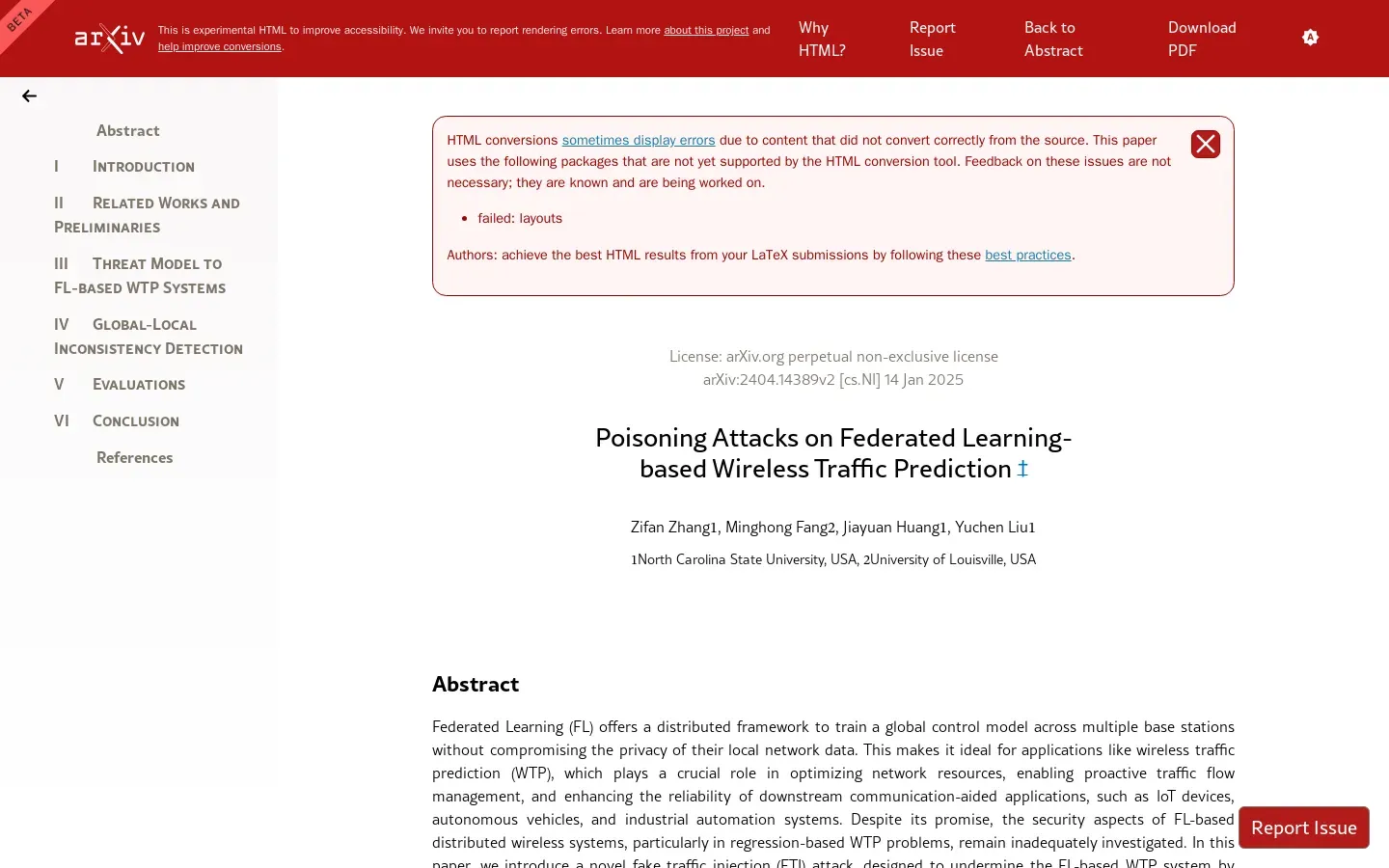
Research Highlights Threats to Federated Learning in Cybersecurity
/ 4 min read
Quick take - A study investigating the vulnerabilities of Federated Learning systems to Fake Traffic Injection attacks has identified critical security needs and proposed the Global-Local Inconsistency Detection defense mechanism to enhance the integrity and reliability of these systems, particularly in real-time traffic management.
Fast Facts
- Researchers investigated vulnerabilities in Federated Learning (FL) systems, focusing on Fake Traffic Injection (FTI) attacks, and proposed defense mechanisms to enhance security in real-time traffic management.
- The study introduced the Global-Local Inconsistency Detection (GLID) mechanism, which effectively identifies data discrepancies indicative of FTI attacks, significantly mitigating model poisoning risks.
- Findings emphasized the need for robust aggregation protocols in diverse network environments, suggesting the use of Lagrange multipliers to improve FL system resilience against various attack vectors.
- The research combined theoretical analysis and experimental evaluations to assess FTI attacks and the effectiveness of the GLID defense mechanism, utilizing robust aggregation rules to withstand Byzantine attacks.
- Future research directions include developing adaptive defense mechanisms and exploring cross-domain applications of FL in cybersecurity to enhance the robustness of aggregation protocols in real-world scenarios.
In the rapidly evolving landscape of cybersecurity, the delicate balance between innovation and vulnerability is constantly tested. With the rise of Federated Learning (FL), a decentralized approach to machine learning where models are trained across multiple devices without sharing raw data, researchers are increasingly focused on understanding its potential and pitfalls. Recent studies reveal a concerning threat: the Fake Traffic Injection (FTI) attack, which not only jeopardizes the integrity of data but also poses significant challenges for real-time traffic management systems. As organizations harness FL for applications ranging from wireless traffic prediction to autonomous vehicle networks, awareness of attack vectors becomes paramount.
The FTI attack operates under the radar, injecting misleading traffic data into a system, ultimately skewing model predictions and leading to erroneous decision-making processes. This manipulation can have far-reaching consequences in critical infrastructure, making it imperative to develop robust defense mechanisms. One promising response is the Global-Local Inconsistency Detection (GLID) framework, which aims to identify discrepancies between global model updates and local data inputs. By evaluating these inconsistencies, GLID significantly enhances the resilience of federated systems against malicious actors seeking to exploit vulnerabilities through deceptive traffic patterns.
As research progresses, it emphasizes not just the identification of these threats but also the development of enhanced security protocols for FL, especially within Internet of Things (IoT) networks. The interconnected nature of IoT devices makes them prime targets for FTI attacks; thus, adaptive defense mechanisms are crucial. For instance, leveraging robust aggregation protocols can safeguard model integrity by ensuring that any manipulated data is effectively filtered out before it influences training outcomes. This proactive approach addresses concerns surrounding model poisoning, where attackers deliberately alter the training process to undermine trust in machine learning outputs.
While significant strides have been made toward mitigating risks associated with FTI attacks and enhancing security measures in federated learning environments, gaps remain. Current limitations highlight an urgent need for further investigation into cross-domain applications of FL in cybersecurity contexts. Exploring Byzantine-robust aggregation rules could enhance model performance under adversarial conditions, fostering a more secure framework within which federated learning can operate.
Beyond technological advancements, understanding broader security implications in distributed systems is essential. A comprehensive evaluation framework should encompass not just detection capabilities but also adaptability to diverse network scenarios—ensuring that defenses evolve in tandem with emerging threats. As researchers conduct extensive experimental evaluations, they provide critical insights into both the effectiveness of FTI attacks and the viability of GLID as a countermeasure.
Looking ahead, it’s clear that while federated learning presents exciting opportunities for advancing AI technologies, it also necessitates a vigilant approach to cybersecurity. The implications for model integrity and trust cannot be overstated; as more industries adopt these decentralized methods, they must prioritize building resilient systems capable of withstanding sophisticated attacks. By fostering enhanced understanding and developing innovative defense strategies against emerging threats like the FTI attack, the cybersecurity landscape can shift towards a more secure future—one where technology serves as an ally rather than a vulnerability.



